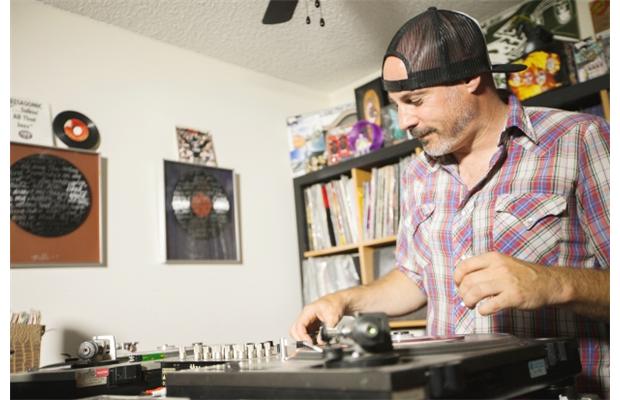
Vinyl Ritchie Vancouver Sun Interview
Vinyl Ritchie’s DJ skills are still in demand (with video)
Electronic music experiences a commercial breakthrough
By Jessica Barrett, Vancouver Sun July 24, 2013
Photograph by: MARK YUEN/VANCOUVER SUN
View the original article and video here.
There’s a fine line between being a collector and a hoarder — and Scott Arkwell casually, self-deprecatingly walks it in Vans sneakers and a trucker hat.
Every corner of his East Vancouver apartment is crammed with the things he loves. Rows of skateboard decks, about a half-dozen deep, lean against a wall, and every counter top — from the kitchen to the bathroom — is home to an otherworldly population of action figurines, each wearing a few millimetres of dust.
Most of the place is set aside for the items with which Arkwell has built a name for himself and an unlikely career that has been going strong for more than two decades. Stacks of 45s line the floor around his turntable setup. They crowd every shelving unit in his apartment, and occupy the second bedroom and the storage closet.
Most people in Vancouver wouldn’t know Arkwell. But for a certain subset, his alter ego Vinyl Ritchie is a household name.
At 43, Arkwell is both a relic and a fixture of Vancouver’s underground scene, known for his continued devotion to the crates of records that he still lugs around in the age of the MP3.
“It’s what keeps me relevant, if I am even relevant,” he says with a laugh.
Judging by the amount of work that keeps pouring in for Arkwell, he is.
You can find his name on the lineups for the growing roster of summer festivals in B.C. dedicated to dance music, and the original music he produces with partner Brian Carson under Wicked Lester on the soundtrack for extreme sport videos and video games. And you will still find him spinning the odd night in Vancouver, his trusty 45s in tow.
Although Arkwell has only ever made a living as a DJ, he admits the recent commercial breakthrough of dance music has been good for business. There is a renewed interest in the old-school skills of selecting and mixing, the very talents that have his phone constantly ringing for gigs these days.
Arkwell has that prescience that separates an armchair iPad DJ from the real thing. He knows what the crowd wants before they know they want it, and has the confidence to challenge them by throwing in something new, old, or unexpected. From punk rock to vintage hip hop, or the latest house track, he knows how to work it in. He will even put on a country song if he thinks the crowd can handle it.
“I’ve kind of made a career out of taking chances,” he says. “Sometimes it doesn’t always work out.”
Individual incidents aside, it has been a good strategy for Arkwell, who arrived in Vancouver in the early 1990s when the dance music scene, recently turned onto house and techno by the likes of David Hawkes, George Maniatis and the Shea brothers (Robert and Mick) was ready for the next step. With the introduction of underground parties, the precursor to raves, Arkwell and his cohort — people like DJ Czech and Tyler Stadius — found themselves the tastemakers of a scene hungry for more musically rich pastures.
“When I first started DJing, you’d go into a club and do a set and you’d play a lot of crap just to get people dancing. You’d play stuff that was on the radio or whatever,” says Arkwell. “And then, lo and behold, all these underground parties started popping up where people didn’t want to hear what was being played in the clubs. They wanted to hear something different.”
It made being a DJ exciting, and also financially viable for those who didn’t want to stick to the confines of Top 40.
“We literally went from making $50 a night to $500 a night for playing for an hour,” he says. “Before that, you had to play for four hours in a club, and it wasn’t all that artistically satisfying because you had to play a lot of schlock, or donkey music as we liked to call it.”
So, with his old-school pedigree, Arkwell can’t help but laugh at the fact his fortunes seem tied to the commercial success of mainstream EDM. Sharing the bill at summer festivals like Shambhala with superstar headliners such as Skrillex has inspired a whole new generation of kids to come check out his shows, he says. He now has a following in towns like Fernie, which never had a much of a dance scene before. Although, often his audiences are surprised to find the DJ has a salt-and-pepper beard and is two generations removed from them.
One kid eyed him up and down at a recent gig before turning to his friend and asking “‘How old do you think this motherf****r is?’” he says, laughing.
As long as they are getting into the music and digging beyond the packaged sound of commercial EDM, Arkwell doesn’t care. In fact, he is all but pinching himself at the life he leads.
“I’m just stoked to be a part of it still,” he says. “I never thought it would turn into a career. It was just something that I always did and loved. I guess I was just a lucky goon in the right place at the right time.”
Leave a Reply


